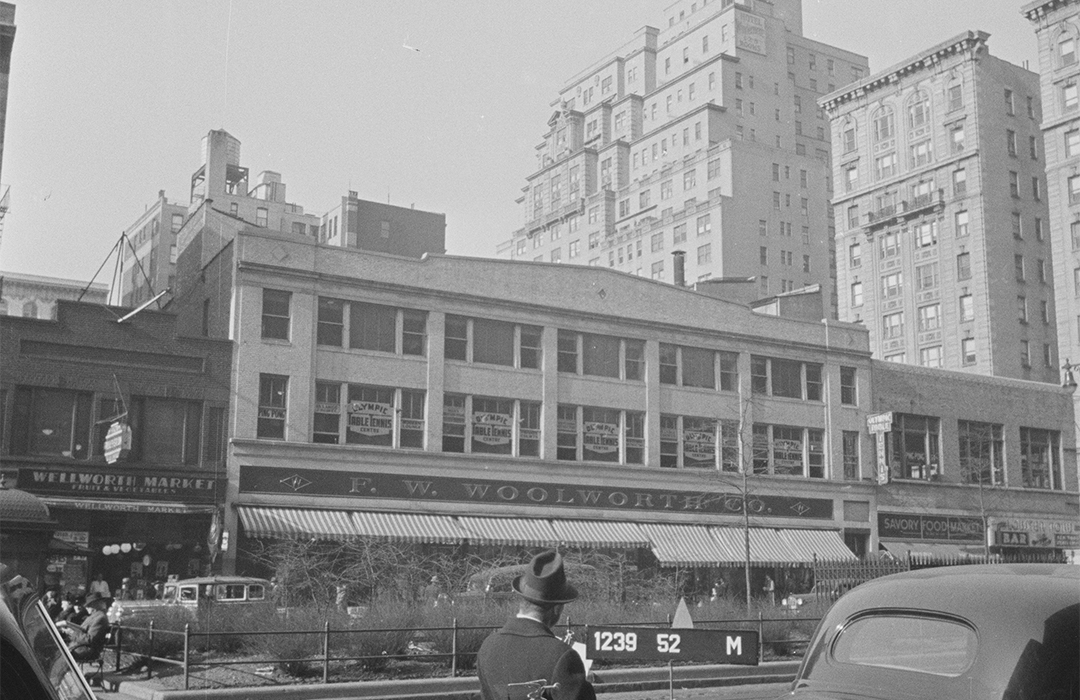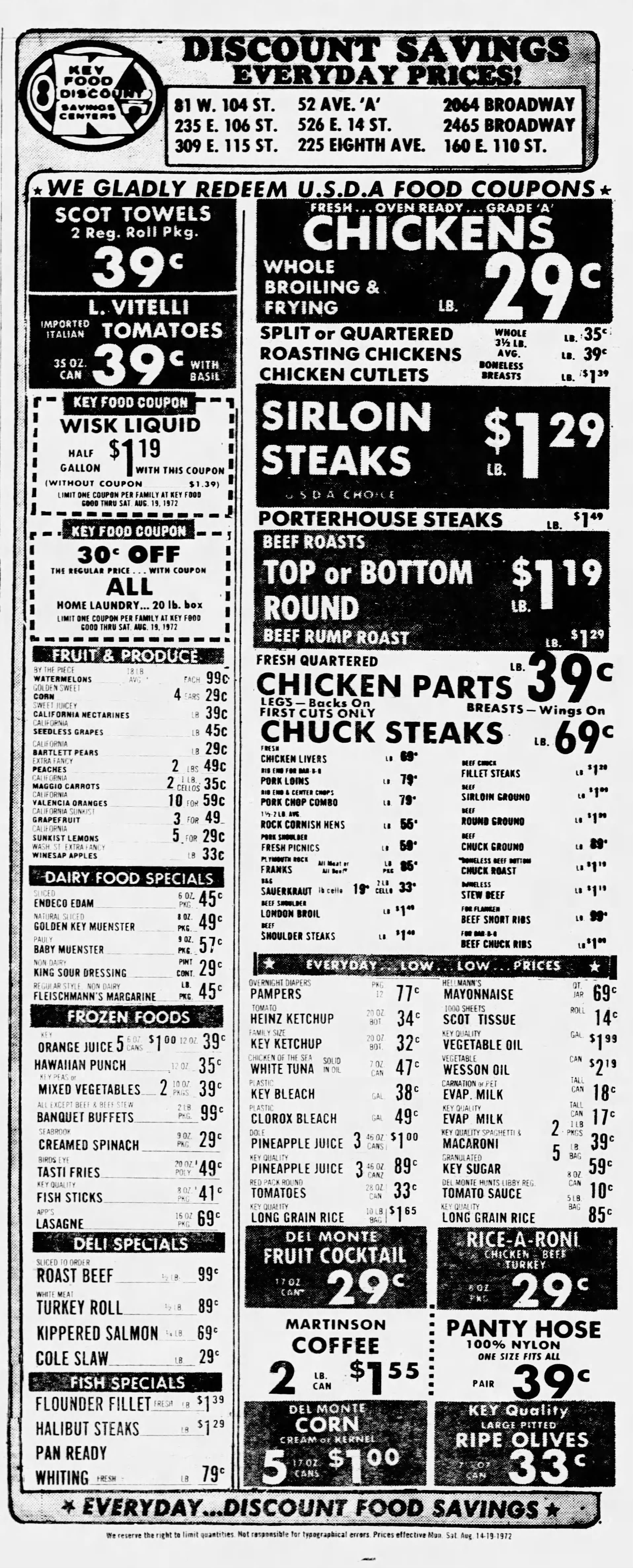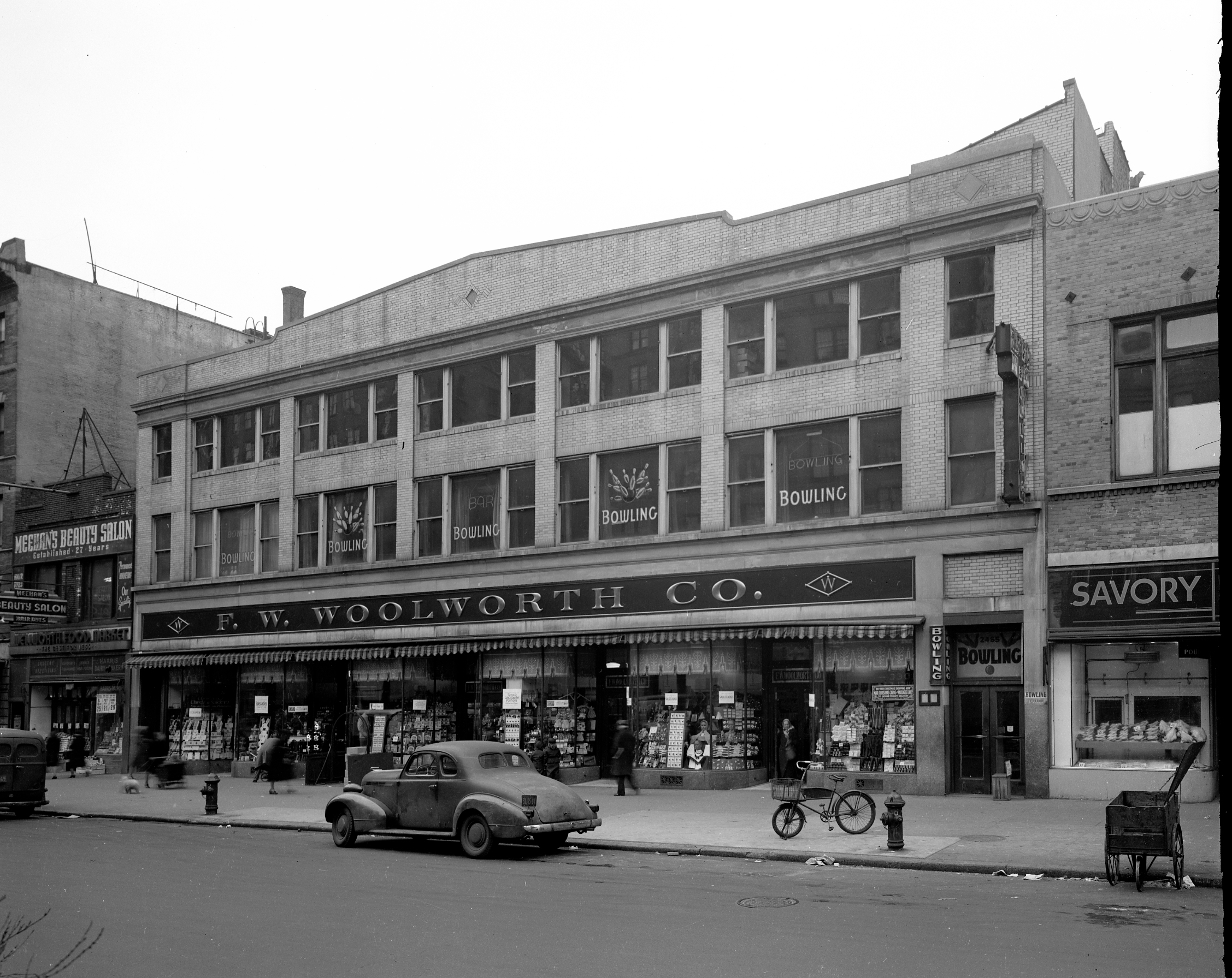
The F. W. Woolworth Co. Building
by Tom Miller
Until 1928 a four-story apartment building stood on the west side of Broadway, midway between 91st and 92nd Streets. That year the F. W. Woolworth Co. signed a long-term lease on the property as the site for its newest Manhattan store. Founded by Frank Winfield Woolworth as Woolworth’s Great Five Cent Store in Utica, New York in 1879, by now it was America’s most successful “five-and-dime” businesses, with a magnificent international headquarters building downtown on Broadway.
F. W. Woolworth Co.’s in-house architect was A. F. Winter. His low, three-story structure followed a tried-and-true design—a spacious retail store on the ground floor, and two rental spaces above. In this case, there would be a restaurant on the second floor, and a pool parlor on the third. His clean, utilitarian design drew more on the waning Arts & Crafts style than the, perhaps, more expected Art Deco. It featured a full-width F. W. Woolworth Co. sign above the store level, expanses of glass on the upper floors, and a peaked brick parapet.
The second floor became home to the Loft Restaurant, known for its “dollar dinner menu.” An advertisement in The New York Sun on November 8, 1930, promised, “Note: If you ever ate a better Dollar Dinner, you need not pay the check!”
His clean, utilitarian design drew more on the waning Arts & Crafts style than the, perhaps, more expected Art Deco.
In reporting that the Cassidy Holding Corporation had purchased the building on April 3, 1931, The New York Sun noted, “The F. W. Woolworth Company holds a fifty-year lease on the premises.” Woolworth brought back A. F. Winter that year to make renovations. The third floor now contained offices and a golf school, while the Loft Restaurant continued to operate from the second.
With money tight during the Great Depression, the Loft Restaurant lowered prices. On March 12, 1935, it advertised its “Famous 65¢ Chicken Dinner,” noting, “NO Liquors. NO Music. BUT pure delicious food. Best you ever tasted or you need not pay the check.”
Woolworth had A. F. Winter remodel the interiors once again in 1939. Where the Loft Restaurant had been were now factory and showroom spaces. Sharing the third floor with a pool parlor was the Vanity Bridge Club, a women’s group. On March 29, 1939, The Vanity Bridge Club advertised: “Contract Rubber Bridge—Every afternoon, evening. Delightful, congenial environment. Instructions.”
But four years later that delightful, congenial environment was upset by police raids. On August 8, 1943, The New York Times reported, “The Vanity Bridge Club, at 2471 Broadway, rendezvous of matronly housewives fond of poker, bridge and gin rummy, was raided by the police about 7 o’clock last night for the fifth time in a year.” The manager, Ruby Epstein, was arrested “on a charge of maintaining the place for gambling purposes,” and 35 card players, 30 of them female, were hauled in on disorderly conduct charges.
A year before the raids, the second floor had been renovated for the West End Enterprises bowling alleys, which remained through 1958. It gave way to the Maharaja India restaurant. Touting its “exotic Oriental cuisine,” it would remain at least through 1965.
Ruth Messinger stayed with the youngsters during the night.
The tradition of remodeling the upper floors continued in 1975. The second floor became the West Side Bingo Hall, and the third floor was renovated into offices, home to the Mid-West Side Community Corp. Here local youth could enroll for the annual New York City summer jobs program. On April 4, 1977, The New York Times reported on the first day of enrollment across the city, saying, “Perhaps the most anxious youngsters vied for the 887 jobs allotted to the Mid-West Side Community Corporation, at 2465 Broadway, near 91st Street.” One boy, 17-year-old Charles Butcher, had stood on line since 1:00 the previous afternoon waiting for the doors to open. “I’m cold, but I don’t mind,” he told a reporter. An 18-year-old girl, Elizabeth Melendez, said, “I brought my blanket and thermos of coffee.”
To ensure their safety, Community School Board 3 member Ruth Messinger stayed with the youngsters during the night. At 2:00 a.m. she telephoned the principal, Murray Schlesinger, who had a key to the third floor. He allowed the teens to wait inside, while parents brought hot coffee and blankets.
After decades in the ground floor, F. W. Woolworth Co. was supplanted by a Key Food grocery store in the last quarter of the 20th century, and then a Duane Reade Pharmacy. By 1996 an Equinox Fitness Club had taken over the space. It expanded into the second floor in 2013.
Tom Miller is a social historian and blogger at daytoninmanhattan.blogspot.com
BUILDING DATABASE
Keep Exploring
Be a part of history!
Think Local First to support the businesses currently at 2465-2471 Broadway:




